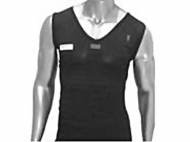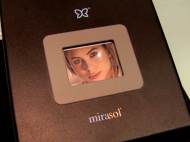T-shirt with sensors and a smart system monitor health
 As Europe’s population ages, chronic diseases are becoming increasingly widespread. In order to provide a seamless system able to monitor heart rate, breathing and physical activity, EU-funded researchers have developed a T-shirt fitted with sensors as well as additional in-home monitoring devices and intelligent data processing technology. Aside being used in telemedicine, the system could be used by athletes.
As Europe’s population ages, chronic diseases are becoming increasingly widespread. In order to provide a seamless system able to monitor heart rate, breathing and physical activity, EU-funded researchers have developed a T-shirt fitted with sensors as well as additional in-home monitoring devices and intelligent data processing technology. Aside being used in telemedicine, the system could be used by athletes.
Developed as a part of the European Chronious project, where a consortium of 14 partners in eight European countries are coordinated by Roberto Rosso, R&D Manager at tele-health provider TESAN in Italy, the smart wearable system is designed specifically for chronic obstructive pulmonary disease (COPD) and chronic kidney disease (CKD) patients, although the people involved into its development claim it could easily be adapted for other uses.
A light-weight T-shirt is equipped with wearable heart, respiratory and activity monitoring sensors, and the system relies on additional information gathered by the external devices such as a digital weight scale, glucometer, blood pressure monitor, spirometer and air quality sensor. Data collected by these sensors is sent to a mobile device such as a smartphone or PDA, which relay the data to their care provider where it is analyzed with intelligent data processing software.
The system is open and modular, thus enabling a flexible approach where different types of sensors can be used according to the monitored condition, making the system particularly adaptable to cases where patients are living with two or more kinds of disorders such as CKD and diabetes.
For CKD patients in particular, the Chronious team developed an innovative food intake program with a simple-to-use user interface so their diets can be closely monitored.
”For doctors one of the big advantages of this approach is that the data is highly accurate. Patients are being monitored every day as they live their normal lives so a better picture of their symptoms and progress can be used to determine treatments”, said Rosso. “For example, eating correctly is crucial for reducing CKD symptoms, but current practice relies on patients filling in questionnaires about what they eat when they go for a check-up and the information they provide may not be entirely accurate.”
Aside eliminating the need for frequent check-ups due to remote monitoring of the patients, the data acquired by the system can be used to finely-tune the treatments to patient’s individual requirements.
The Chronious team tested the system in two trials involving 50 patients in Spain and 60 patients in Italy who suffer from COPD and CKD, and have just been awarded EU funding for a follow-up project called Chromed in which the researchers plan to carry out more extensive trials with at least 300 patients in Spain, Estonia, Slovenia, Sweden and the United Kingdom.
”The trials in Chronious were very successful and the user feedback was useful in refining the system and user interfaces. Chromed will extend this work and we will focus the system specifically on monitoring patients with comorbidity. The trials will provide objective data on the benefits of the system”, said Rosso.
Aside further development of the system, the Chronious consortium partners are also working on developing the technology commercially for both the healthcare industry and other sectors such as sports where the system could be used to schedule training and diets in order to increase athlete performance.
”In the sports world money isn’t as much of an issue so some of this technology could find applications there first. The vests we used in the Chronious trials are expensive and we are looking for cheaper alternatives for the healthcare market”, Mr Rosso explains. “Nonetheless, the market and demand for this kind of eHealth technology is big and we have had interest from healthcare providers around the world, including the United States and China.”









Leave your response!